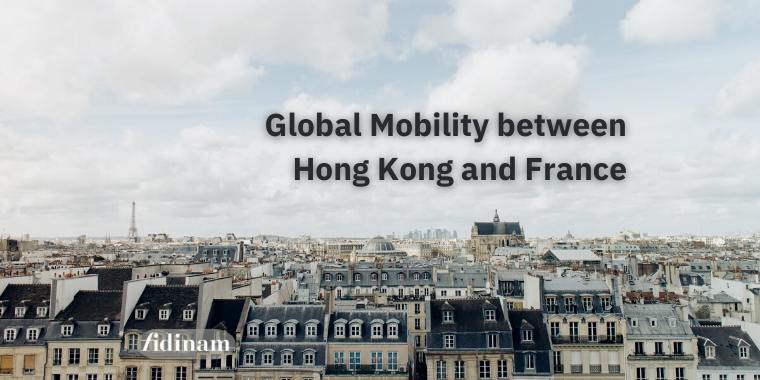
Retaining key staff is essential for the success of a business. Hong Kong employers are fully aware of it and constantly strive to provide more flexibility to their employees, including international mobility. In a series of articles, Fidinam will address some possible work arrangements Hong Kong companies can offer to foreign staff willing to work from Europe. This third chapter is dedicated to Switzerland.
Options will depend on whether or not your Hong Kong business has a presence in France. If so (having a subsidiary or a sister company therein), Hong Kong companies can consider dispatching or transferring their staff under that French entity.
If not, Hong Kong employers can simply decide to keep some staff under Hong Kong payroll while having them working from France. Either way, this will trigger some consequences in terms of taxes, social contributions, and immigration.
When employees are kept under Hong Kong payroll while working from France, their Hong Kong employer shall keep declaring their remuneration under their Employer’s Return. Subsequently, employees shall keep filing an Individual Tax Return in Hong Kong, reporting the same remuneration. However, as long as spending less than sixty (60) days per year in Hong Kong, employees working from France shall be fully exempted from Hong Kong salaries tax. This means no more tax liability, but reporting is still mandatory.
When employees are transferred to and hired by a French entity, they shall in principle no longer pay salaries taxes in Hong Kong. However, having a staff abroad fully dedicated to the production of Hong Kong income may characterise the presence of a permanent establishment of the Hong Kong company, in the relevant jurisdiction (France) with profits taxable locally. This is to be assessed on a case-by-case basis, and we recommend seeking advice upfront.
Consequences in terms of Mandatory Provident Fund (MPF) are similar whether the foreign staff is kept under Hong Kong payroll while working from France, or transferred to a French entity becoming its new employer. In fact, foreign employees working and residing overseas (France), who do not hold any Hong Kong employment visa, have no sufficient ties with Hong Kong to fall under the Mandatory Provident Fund (MPF) Scheme. Hence, no MPF contributions shall be due. This might differ for staff splitting their time between Hong Kong and France, and/or holding an Employment Visa entitling them to work from Hong Kong.
Besides, foreign staff originally working in Hong Kong and transferred to France may ask for an early withdrawal of their MPF contributions if they permanently leave Hong Kong.
If no longer working from Hong Kong, foreign staff (even if still under Hong Kong payroll) are not required to hold any Employment Visa. Sporadic visits to Hong Kong can be sufficiently substantiated by a Tourism Visa. However, this differs if the frequency of the visits to Hong Kong increases and/or if foreign staff need to work from Hong Kong over longer periods of time (exceeding short business trips).
Whether foreign employees work in France for a Hong Kong or a French employer, this triggers some French taxes, social contributions, and immigration consequences to anticipate; closely linked to the tax residence status of such employees.
IRPP
French tax residents are subject to personal income tax ("Impot sur le revenu des personnes physiques” or ‘IRPP’), on their worldwide income, which encompasses all types of revenues including business income, employment/self-employment income, capital gains, but generally excludes real estate income (which is mots of the time taxed in the country where the property is located).
IRPP applies at progressive rates, varying from 0% (from taxable income exceeding 10.225 EUR) to 45% (for taxable income over 160.336 EUR).
Property wealth tax
Employees who were not tax resident in France over the past 5 years, will become subject to property wealth tax only on their French properties, if their aggregate value is above 1,3 Million EUR. Properties located abroad will not fall within the scope of property wealth tax, during 5 years upon returning/establishing tax residence in France.
Impatriation regime
Under specific conditions, individuals who have not resided in France over the past 5 fiscal years, and who receive an employment offer, negotiated and agreed upon, while they were still residing in Hong Kong, can benefit from the so-called impatriation regime.
Under this scheme, personal income tax exemptions are granted on:
This preferential regime can be extended up to the 31st of December of the 8th calendar year following the start of their employment in France.
Employees working for a French employer will automatically be enrolled into the French statutory social security pension system.
Employees working for a Hong Kong employer, but fully or mostly working from France, shall also pay social contributions in France.
The rate applied to employees is 20% to 23% of their remunerations, whereas the employer’s share of contributions represents 45% of the gross salary.
French passport holders, as well as EU passport holders, do not need a visa to work and reside in France.
For non-EU passport holders, different types of work visas and residence permits are available, depending on the nationality and the type of work or residence contemplated in France. The visa application shall be done at the French ambassy or consulate 3 months before arrival.
Full details of the available visas are available on the French Government website.
Fidinam has offices worldwide and can assist you with all administrative and tax difficulties triggered by these flexible working arrangements, both in Hong Kong and in France. Contact us via the form below to seek advice or email us at info@fidinamgw.com.
All content © . All Rights Reserved.